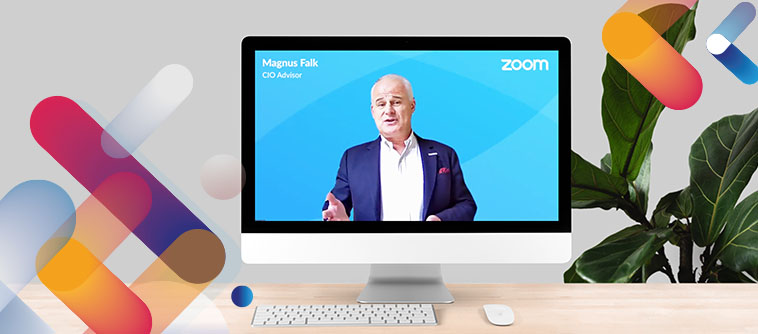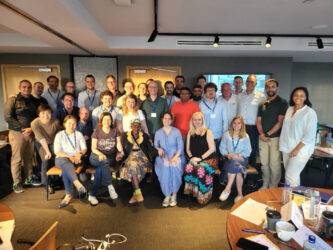Companies must now learn how to overcome the twin challenges of managing a hybrid workforce and the needs of remote consumers, according to Zoom CIO Advisor Magnus Falk.
The lightning fast adoption of digital technology during the pandemic has triggered a once-in-a-generation, seismic shift to a world where people will work and consume when, where and how they want, the former Credit Suisse Chief Information Officer EMEA said in his OWP liVe keynote address.
“It took a pandemic to show what was truly possible,” Falk said. “A side effect of the nightmare we’ve been plunged into is that we’ve all been thrust into this global experiment about how to work differently and what our customers need.”
“A fundamental part will be to allow people to work and customers to consume where, when and how they want … The rules of work have changed – the limitations of the past have been proved wrong. People can be highly productive and effective remotely.”
Falk, who now works with company CIOs to tailor Zoom’s services to their needs, cited three trends that were driving, and would underpin, this new way of working and living.
Automation is accelerating
Innovation has gripped every sector, from remote surgery and learning to videoconference court and parliament sessions. “It’s that do or die moment in many sectors,” he said. “According to Bill Gates, this might be one of those special years when 10 years of innovation in a single year is a possibility.”
The business landscape is shifting
The pandemic has forced companies to reimagine what they do, with banks offering video appointments for mortgages, retailers providing personal shopping experiences online and companies allowing employees to choose how they work. “Iconic brands are reinventing themselves or, at least, their business processes,” he said. “People are making choices that weren’t previously an option.”
5G will supercharge everything
As the latest mobile connectivity rolls out around the world, Falk predicted the acceleration of the first two trends, with previous bandwidth issues disappearing. “It will allow employment by any company in any connected global location,” he said. “It’s going to be good for people and for locations that were previously far away.”
The dream – and significant challenge – of remote working
Moderating the session, IMD President and Nestlé Chaired Professor Jean-François Manzoni observed the challenge of managing a remote or hybrid workforce was perhaps even more complex than it had first appeared, including the expectations that leaders have of their teams.
“The questions that we are going to have to answer over the next few weeks and months will go way beyond work from home policies but will really be about how can and should the work be rethought,” he said. “What implications does that have for the expectations that we have of one another but also for design of workspaces?”
Zoom rocketed from 10 million users in December 2019 to 300 million in April this year as the impact of the COVID-19 pandemic forced a mass exodus of workers from their workplaces to their homes.
“Right now, of course, Zoom has almost become like Kleenex – a generic word – is this face-to-face or is this Zoom? Do you anticipate that growth will continue or do you see at some point some plateauing and some return?” asked Manzoni.
“The genie is out of the bottle,” Falk explained. “People don’t want to go back, but then they want a bit of both – they want to work from home and have some interaction with the team. We are going to go to a hybrid workstyle. The prevalence of capacity to interact remotely will be with us forever.”
‘Take control of remote working, or it will take control of you’
Questions from participants ranged from how to make videoconference meetings feel more like the real thing to how to deal with the ups and downs of working from home.
Manzoni tackled the issue of cybersecurity, which had triggered concerns earlier in the year as Zoom’s user population exploded.
“Cyber security was an issue – we had this on occasion, we had clients saying I don’t want to use Zoom – it’s a security issue. Have you guys addressed this and is this still an issue?” he asked.
Falk said action had now been taken to improve security but admitted that mistakes had been made.
“It was clear when you get so many people on your servers, it wasn’t finetuned for consumers just picking up and running with the platform so we had to change the defaults,” he said. “We made mistakes. We think we’ve fixed them. We also want to listen – security is absolutely top of mind at Zoom.”
The IMD president also questioned Falk’s hypothesis that, due to the widespread adoption of digital platforms, work will be organised around life, given that “work has been encroaching more and more on family life and many of us are working longer rather than shorter [hours].”
“This takes discipline and it takes getting used to,” Falk said. “It takes managers knowing this is the way you want to work. People will start scheduling their calendars in order to make their lives more possible. Take control, otherwise it will take control of you.”



